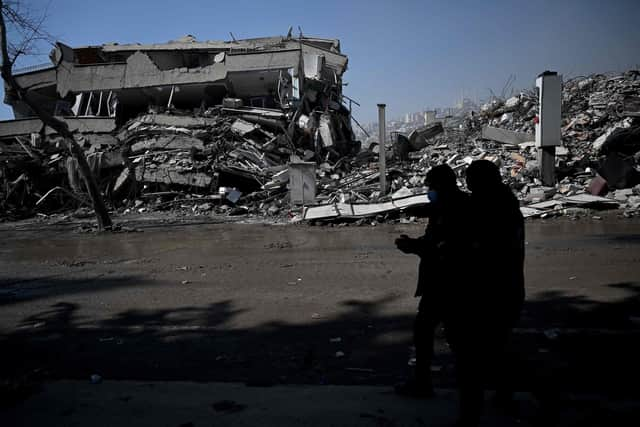Turkey arrests building contractors six days after earthquakes
The death toll from Monday’s quakes stood at 28,191 on Sunday morning, with more than 80,000 others injured, and is certain to rise.
As despair also bred rage at the agonisingly slow rescue efforts, the focus turned to who is to blame for not better preparing people in the earthquake-prone region which includes an area of Syria that was already suffering from years of civil war.
Advertisement
Hide AdAdvertisement
Hide AdEven though Turkey has, on paper, construction codes that meet current earthquake-engineering standards, they are rarely enforced, explaining why thousands of buildings slumped on to their side or pancaked downwards on to residents.


Turkish Vice President Fuat Oktay said late on Saturday that warrants have been issued for the detention of 131 people suspected to being responsible for collapsed buildings.
Turkey’s justice minister has vowed to punish anyone responsible, and prosecutors have begun gathering samples of buildings for evidence on materials used in constructions.
The quakes were powerful, but victims, experts and people across Turkey are blaming bad construction for multiplying the devastation.
On Sunday, authorities in the province of Gaziantep arrested two people who are suspected of having cut down columns to make extra room in a building that collapsed, the state-run Anadolu Agency said.
A day earlier, Turkey’s Justice Ministry announced the planned establishment of “Earthquake Crimes Investigation” bureaux.
The bureaux would aim to identify contractors and others responsible for building works, gather evidence, instruct experts including architects, geologists and engineers, and check building permits and occupation permits.
A building contractor was detained by authorities at Istanbul airport on Friday before he could board a flight out of the country.
Advertisement
Hide AdAdvertisement
Hide AdHe was the contractor of a luxury 12-storey building in the historic city of Antakya, in Hatay province, the collapse of which left an untold number of dead.
The detentions could help direct public anger toward builders and contractors, deflecting attention away from local and state officials who allowed the apparently sub-standard constructions to go ahead.
Turkish President Recep Tayyip Erdogan’s government, already burdened by an economic downturn and high inflation, faces parliamentary and presidential elections in May.
Survivors, many of whom lost loved ones, have also turned their frustration and anger on authorities.
Rescue crews have been overwhelmed by the widespread damage which has affected roads and airports, making it even more difficult to race against the clock.
Mr Erdogan acknowledged earlier in the week that the initial response has been hampered by the extensive damage.
He said the worst-affected area is 310 miles (500km) in diameter and was home to 13.5 million people.
During a tour of quake-damaged cities on Saturday, he said a disaster on this scale is rare, and again referred to it as the “disaster of the century”.
Advertisement
Hide AdAdvertisement
Hide AdRescuers, including crews from other countries, continued to search the rubble in the hope of finding additional survivors who could yet beat increasingly long odds.
Thermal cameras were used to probe the piles of concrete and metal, while rescuers demanded silence so they could hear the voices of the trapped.
A six-year-old boy was removed from the debris of his home in Adiyaman city on Sunday, 151 hours after the quake.
The rescue was broadcast live by HaberTurk television, showing the child wrapped in a space blanket and put into an ambulance.
An exhausted rescuer removed his surgical mask and took deep breaths as a group of women could be heard crying with joy.
Turkey’s health minister, Fahrettin Koca, posted a video of a young girl in a navy blue jumper who was rescued.
“Good news at the 150th hour. Rescued a little while ago by crews. There is always hope!” he tweeted.
The efforts of a team of Italian and Turkish rescuers also paid off when they removed a 35-year-old man from the wreckage in the hard-hit city of Antakya.
Advertisement
Hide AdAdvertisement
Hide AdMustafa Sarigul appeared to be unscathed as he was carried on a stretcher to an ambulance, 149 hours after the first quakes, private NTV television reported.
Overnight, a child was also freed in the town of Nizip, in Gaziantep, state-run Anadolu Agency reported, while a 32-year woman, was rescued from the ruins of an eight-storey building in the city of Antakya. The woman, a teacher named Meltem, asked for tea as soon as she emerged, according to NTV.
In Kahramanmaras, near the epicentre of the first 7.8 quake that struck early on Monday morning, efforts were under way to reach a survivor detected by sniffer dogs beneath a now-flattened seven-storey building, NTV reported.
However, those found alive remain the rare exception.
A large makeshift graveyard was under construction in Antakya’s outskirts on Saturday.
Diggers and bulldozers dug pits in the field as trucks and ambulances loaded with black body bags arrived continuously.
The hundreds of graves, spaced no more than 3ft (1m) apart, were marked with simple wooden planks set vertically in the ground.
The picture is less clear of the plight across the border in Syria.
The death toll in Syria’s north-western rebel-held region has reached 2,166, according to the rescue worker group the White Helmets.
The overall death toll in Syria stood at 3,553 on Saturday, though the 1,387 deaths reported for government-held parts of the country has not been updated for days.